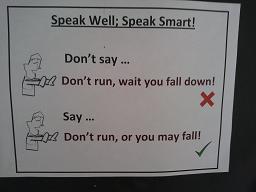This “special edition” is written to lend support to this year’s “Speak Good English Movement”, which was launched yesterday.
WittyCulus.com is founded on good English and I’m proud of this. Without it, it will indeed be difficult to communicate many things across to our readers, especially when there is an element of wit. Opportunities for word play, pun, parody and others would have been limited; perhaps improbable, as such.
Thankfully, I am amply equipped. And I say this unabashedly, because you too can learn proper English if you put in some effort. Like in “taking a little step each day” and “actively seeking out the tools and resources* available” — this is the gist of the 2013/2014 “Speak Good English Movement” just launched.
*Note: Check this page for Partner Programmes:
http://www.goodenglish.org.sg/category/movement/over-the-years/over-the-years-2013-2014/partner-programmes-2013-2014
Speak Good English Movement
The “Speak Good English Movement” (SGEM) is here again. This program to promote proper usage of the English language has been around since the year 2000, as seen on the official website at http://www.goodenglish.org.sg. (Note: this site loads very slowly; no idea why.)
Over the years, SGEM’s theme has evolved:
- 2000 – 2004: Speak Well. Be Understood.
- 2005 – 2006: Speak Up. Speak Out. Speak Well.
- 2006 – 2007: Be Understood. Not only in Singapore, Malaysia and Batam.
- 2007 – 2008: Rock Your World! Express Yourself.
- 2008 – 2009: I Can.
- 2009 – 2010: Impress. Inspire. Intoxicate.
- 2010 – 2011: Get It Right!
- 2011 – 2012: How You Speak Makes a Difference.
- 2012 – 2013: Make Good English Stick.
- 2013 – 2014: (No slogan provided) See my proposal below…
Is It All Work and No Play?
While learning and using a language is a serious undertaking, perhaps what’s missing in all this is the fun aspect. None of the slogans suggest it is quite do-able for anyone to learn to speak standard English, though the ones for 2006/07 and 2007/08 tried to relate to the younger generation.
I believe something punny would have made it all more approachable. Maybe the Movement should use this for next year’s campaign:
Be More Better At English.
Or even this year, since no official slogan was provided on the website.
Check Your Mugs!
And since the medium for communicating this year’s message is drinking mugs, why not just promote this playful idea:
Are you scoring with English? Check your mugs now!
Note the WittyCulus play (can’t help it) on the word “mugs” — sounds a bit like “marks”, don’t you think? Plus, asking people to check their mugs — What mugs are they talking about? — would pique their curiosity and encourage discovery. Sounds like Marketing 101 in action. I hope the authorities pick up on this simple but fun idea 🙂
Nevertheless, start polishing up on your English today. It does require continual effort, so learn to use it a bit more each day. As an example, this blog is one way I keep my English standard up. The “pressure” comes from having others read what I’ve got to say; and I make sure I say it right.
Don’t forget to get your cuppa at designated F&B outlets which are supporting the SGEM — details are on the website. Drink up, check your mug and heed the message on it. Remember, a little each day…
Is There Still A Place for Singlish?
The purpose of my Singlish Primer is to have fun learning about the origins of Colloquial English. It can serve as a simple introduction for foreigners to understand the basics of local-speak and thus feel more at home.
 What’s more, it is a useful reminder that proper English prevails for everyone’s benefit. To underscore this point, I’ve made some changes to how I present the Singlish Lessons.
What’s more, it is a useful reminder that proper English prevails for everyone’s benefit. To underscore this point, I’ve made some changes to how I present the Singlish Lessons.
The section “Back to English” has been re-titled as “Speak Good English” and its contents now use a (slightly) more serious “Don’t say this:” / “Say this instead:” approach to show the correct English form.
As Singlish is part of Singapore’s culture, WittyCulus.com isn’t going to ignore its existence. Instead, I will harness every opportunity it provides to promote use of proper English. While continuing with my effort to provide anecdotal evidence of how this creole language came about.
It will be like “learning from the bad in good Singlish“. Sounds like an oxymoron? Well, yes to the “oxy” part — wit is our oxygen here, the source of keen discourse.
But a definite no to “moron”. Nothing doing. Ha.





![Go on a journey to learn Bob [The Secret] Proctor's other secrets... 11 Forgotten Laws button ad](http://www.the11forgottenlaws.com/project/media/images/affiliates/banners/250-250a-v2.jpg)

